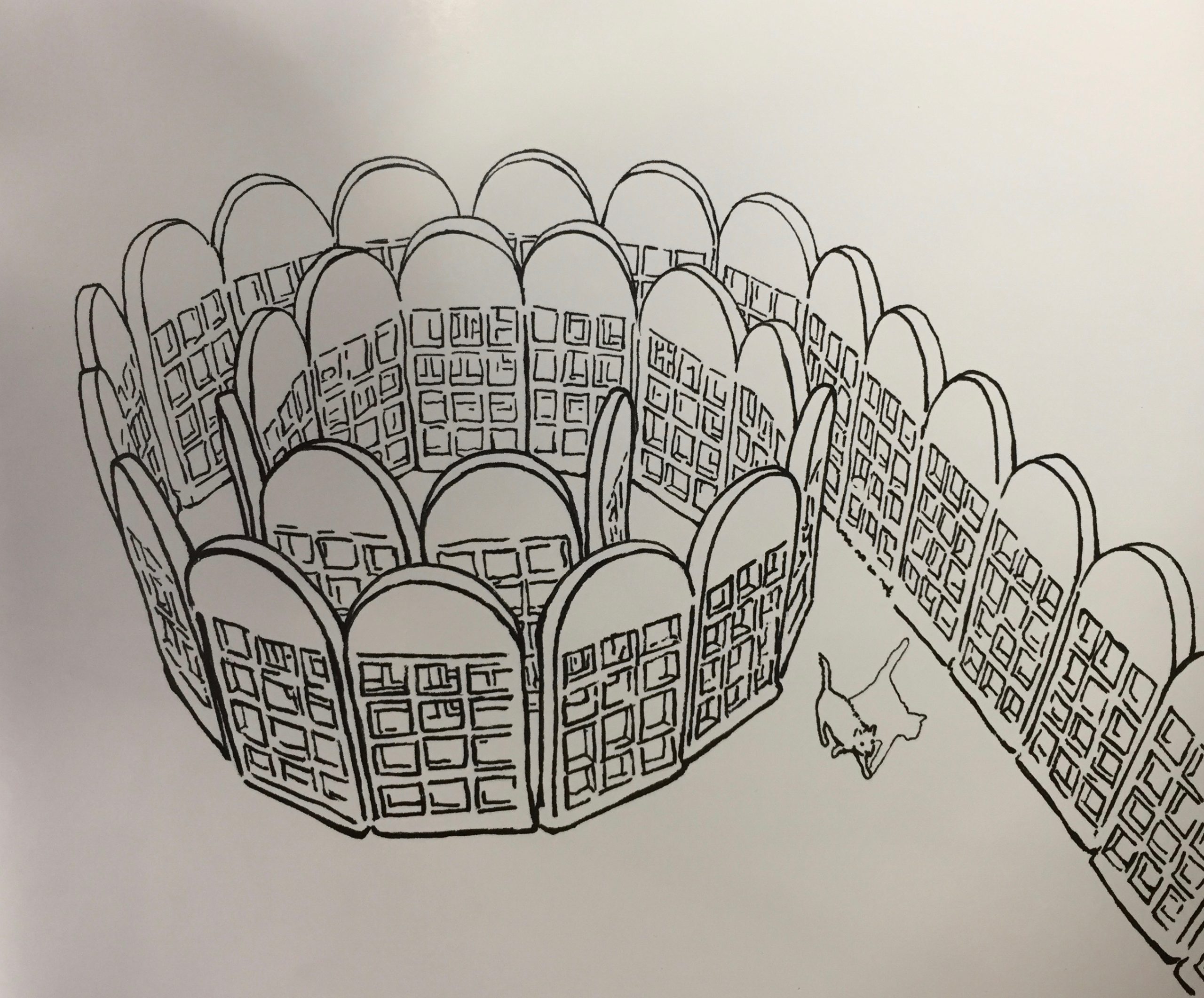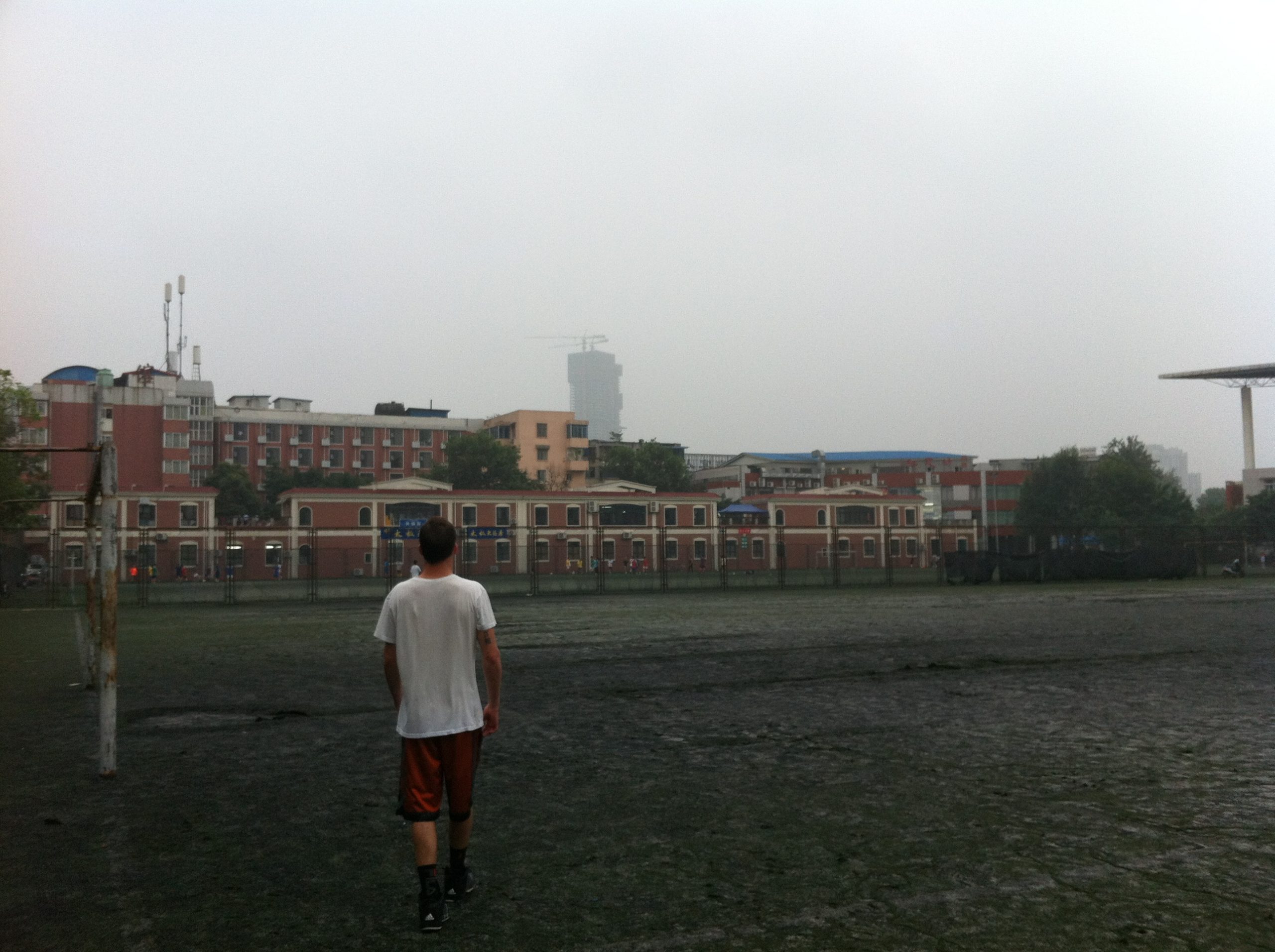On a university campus in Chengdu, which is located in China’s Sichuan province, I walked down the sidewalk. I was thinking through a piece of writing. Perhaps I should have switched the order of those sentences, as I was more present in the thinking than the walking. I hadn’t yet realized it, but a boy of about four years was also walking down the sidewalk. He chattered noisily in Chinese, I think, though he may have been speaking gibberish, as children sometimes do. Whatever the case, the boy’s middle-aged male caretaker was not responding to the jabbering. The boy jawed, looking from the sidewalk to his caretaker alternately. The pace achieved by his child’s legs was inhibited by the oscillations of his head, so I quickly gained on him. After concentrating on the sidewalk for a moment, he again broke the concentration he was giving to walking in order to survey his surroundings and check up on his caretaker. He looked up and back, over his shoulder, to the moving location in space where recent history dictated that his caretaker would be following. Instead of finding a familiar face occupying that space, he saw mine.
That of a six-foot foreigner.
Waiguoren. Caucasian, blue eyes, brown hair, sweating from a work-out in the heat of a Chengdu summer. Clearly not the five-foot-six-inch, black haired, casually dressed human he had been expecting.
Such a schism between casual expectation and reality might have terrified other children his age, but this boy was giddy. He smiled broadly, then he increased the volume and speed of his chattering. Whether it was Chinese or gibberish that the boy was speaking did not matter, as I don’t speak Mandarin, Cantonese, or gibberish. I’m quite certain he thought I understood him. The reality that I might not speak the languages he had command over was outside of this boy’s realm of the possible. Because children are egocentric, solipsistic even. In his head, I understood what he was saying. I swear I didn’t.
He was so enthusiastic about the idea he had just articulated that he had to follow through on the proposal immediately. He started a game of “on-off sprint-walk.” I know this because I speak body language fairly fluently. Whimsicality took hold on witnessing his enthusiasm and I joined in his game.
Taking fast-paced quarter-steps I scarcely kept pace. My shorter steps combined with the rapid churning of my feet gave an illusion of maximum exertion. The boy laughed maniacally at his realization that he was the faster and more dominant of the racers.
Unannounced, he gained a few paces’ advantage and suddenly turned around, ‘cornering me’ on the sidewalk. He had changed the game.
With a few jab steps I managed to get around him and escape the trap. He outpaced me and within seconds I was again cornered.
Soon the boy’s caretaker caught up with the combatants, as our progress was slowed by repeated cornerings and the ensuing juking. The caretaker thus became an obstacle, a pillar that cut the sidewalk’s juke space in half.
This loss might have been a tragedy, might have found me doomed to inevitable capture, but I saw it as a fortunate out. I suffer from a short attention span brought on by years of channel surfing, web surfing, and text messaging. Thus, after a mere 47 seconds, I had grown quite bored of the game and allowed my opponent to catch me. Still giggling madly, he grabbed handfuls of my t-shirt to demonstrate that he had, in fact, caught me. He’d won.
That is when my adversary’s evil genius became manifest. He quickly realized that this ‘win’ might be the ‘end,’ but he was also fully aware that he DID NOT WANT THIS GAME TO END. So, this 6 year-old evil genius pulled the Evil Genius Special: “I’m going to maintain the exact line of motion/trajectory that got this started in the hopes that nothing else in the world will change, and thus I’ll get to keep having my fun as long as I want.” Things are fun as long as I decide when they end.
So he let go. And simultaneously jumped a few paces ahead of me, urging me to deke my way around him and drawing me out of my recalcitrant posturing.
I relented. I would have to get around him if I wanted to get home anyway.
He was still giddy. Cackling.
It was contagious. By the end of Act 2, Scene 1, I was re-engrossed. I even added some creativity to my footwork. Each time he outpaced then cornered me, which often happened with a light post or sidewalk-tree wedged between us, I would add a new move to my ‘get around him’ repertoire. First the ‘double jab-step,’ then the ‘backpedal,’ then the ‘spin move’. We played the game for several minutes, continuing down the long dormitory block.
150 yards down the sidewalk, my naïve self still absorbed and just having concluded that this was the best thing to happen to me in China, and that maybe I ought to adopt this kid and teach him English, the pendulum swung. The next obstacle he thought about putting between us, the next obstacle he wanted to watch me sidle around with some new shimmy, was a shiny, yellow payphone.
It was arresting. It wasn’t ringing. The boy couldn’t even reach the receiver, but he stood there, petting the metal chord. He looked longingly about for his caretaker who would take the receiver off the hook and free the soothing murmur of the dial tone.
The yellow payphone.
It was over.
He forgot me. He would no longer chase me. Never again. His caretaker seemed to recognize the potential retrospective importance of the moment, perhaps the boy’s first interaction with a foreigner. I imagine that this recognition was the reason the caretaker implored the boy, several times, to say goodbye.
It was fruitless. Just as I no longer attracted the boy’s attention, the caretaker could not direct it. I was chasing now. But he wasn’t playing, so what was I chasing? My own fleeting object of intrigue.









